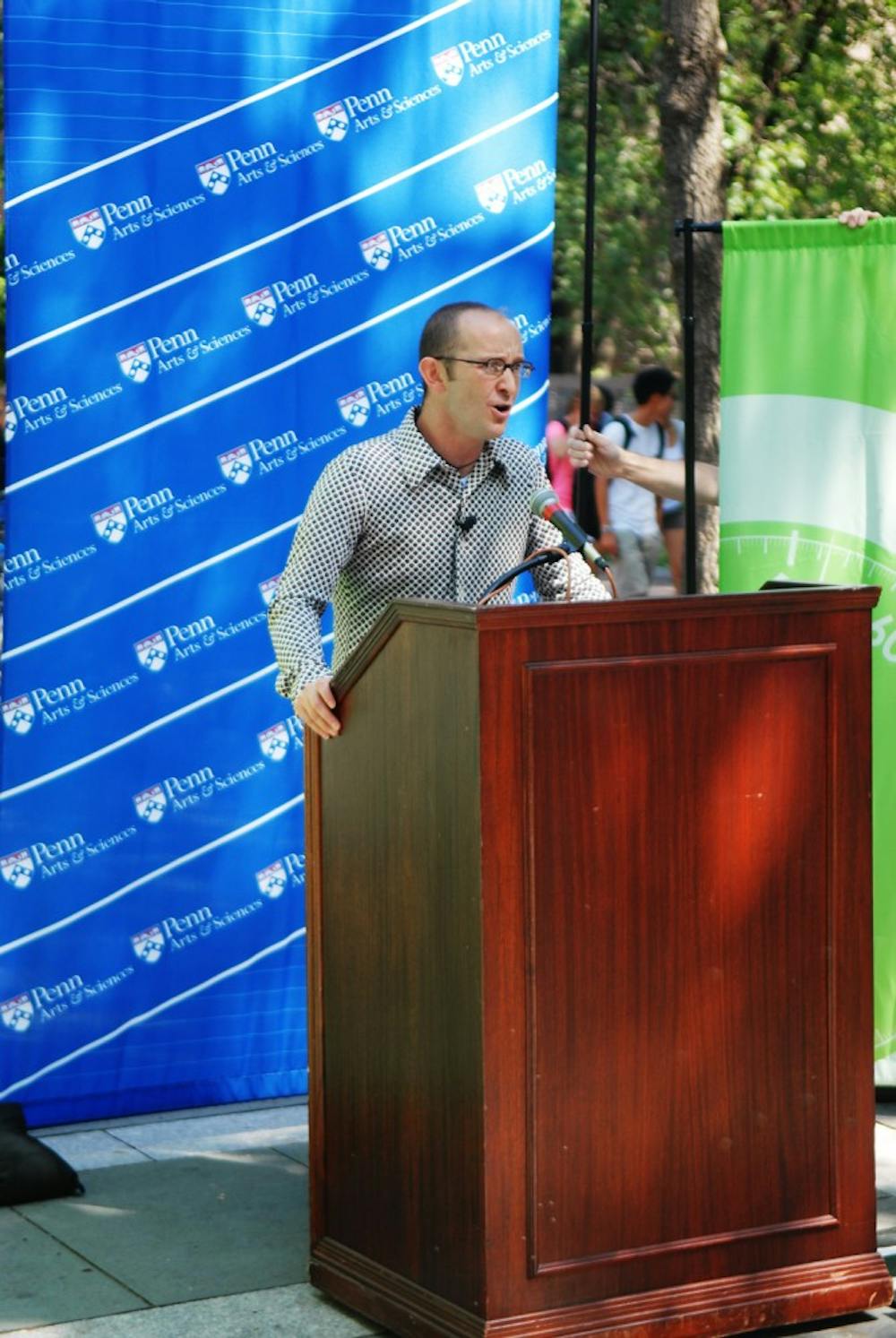Penn students’ hectic schedules rarely permit them to spare a minute. But, thanks to the 60-Second Lecture series, those who do reap substantial rewards.
Hosted by the School of Arts and Sciences each semester, the series invites professors across all disciplines to deliver lectures on topics within their fields of expertise.
While professors face few constraints on the content of their lectures, they are asked to avoid passing the one-minute mark, a limitation that many of them find to be difficult.
“I wrote a paragraph that was just a tiny little thing, then I read it and timed it and it was three-and-a-half minutes,” English professor and Director of the Penn Humanities Forum James English said. “So I cut everything I could, whittled it down and read it, but it was still about a minute and a half.”
His lecture ended up lasting just under 100 seconds.
“It’s always harder to go short than long,” English said. “We see that all the time at our conferences and lecture events. It’s never the case that you have extra time.”
He added that the 60-second limitation makes for a “very bare lecture” in which one can make “general statements but [has] no time to illustrate or support them.”
Law School professor Sarah Gordon encountered similar difficulties when condensing her lecture on freedom of religion from seven minutes to the requisite 60 seconds.
“At first I thought I’d left out so much people wouldn’t get it,” she said. “But people are smarter than you think. I was asked some great questions afterward.”
Despite its challenges, Gordon found the process of writing a minute-long lecture rewarding.
“One of the best things about an academic is that people are constantly pushing you out of your comfort zone,” she said.
Director of the Critical Writing Program Valerie Ross, who started the lecture series as director of summer sessions in 1999, saw the lectures as an engaging way of increasing traffic on Locust Walk.
“Back in those days, it was like tumbleweeds were rolling across campus in summer because nobody was around,” she said.
The lectures were supplemented by free food and live music performances and open to residents of West Philadelphia.
Ross recalled that the summer session lectures consistently commanded a large turnout. “Some faculty members would show up, construction workers, kids from West Philly, Penn students, visiting students, administrators,” she said. “It was a wonderfully mixed crowd.”
The series now runs during the school year for four consecutive weeks in both the fall and spring semesters under the direction of SAS Director of Public Relations Loraine Terrell.
While each live talk generally draws from 25 to 50 students, Terrell said, the lectures outlive their brief on-campus appearances once posted to the internet via such platforms as iTunes University, YouTube and Facebook.
“People continue to access these lectures indefinitely,” Terrell said. “We still get comments through these social network sites to talks that have been given years ago.”
The lectures’ growing popularity shows no indication of waning.
“We’re up to 55 or so talks in our library, and it just seems that the bigger the archive gets the more people become aware of it,” Terrell said.
Penn is not alone in its initiative of condensing vast amounts of knowledge into 60-second sound bites.
Creighton University, a private Jesuit university in Omaha, Neb., began organizing 60-second lectures in 2005 at the suggestion of the Student Honors Board president at the time.
According to Creighton psychology professor and Director of the Honors Program Isabelle Cherney, the Student Honors Board selects the theme of each semester’s lectures on the basis of student interest and relevance to current events.
This semester’s lectures, which generally attracted about 100 attendees, all addressed the influence of the media on American politics.
“We sort of make a contest out of it,” Cherney said. “Whoever is the closest to one minute gets the most applause.”
Senior Chelsea Coalwell, co-president of the Honors Program at Regis University — a private Jesuit school in Denver, Colo. — brought the 60-second lecture to her campus after hearing about Creighton’s series at a conference for Jesuit schools.
“The first time we did it, we had 80 people attend, and last time we had 110,” Coalwell said. “The student body [at Regis] is only 1200 undergraduates, so that’s pretty significant.”
Like Creighton’s series, the lectures at Regis generally aim to address a central theme. However, this spring’s installments may be “more vague,” according to Coalwell.
“We’ll give professors one word — maybe ‘time’ — and that gives them more flexibility to talk about whatever they want,” she said.
Coalwell added that the lecture series grants both students and professors the opportunity to engage in dialogue outside the classroom.
“You can’t really discuss substantial things thoroughly, but you can bring up points of interest and get people thinking,” she said.
Terrell likewise cites generating discussion as one of the lectures’ most valuable functions.
“Our faculty are a great resource who have expertise in so many relevant, important areas and in a crowded environment it’s hard to get people’s attention,” she said. “Asking faculty to take part in this challenge is a great opportunity to put interesting thoughts out there for people who may not have accessed them otherwise.”
This article has been edited from its print version to reflect that Chelsea Coalwell is a student at Regis University in Denver, Co., not Regis College in Weston, Mass.



